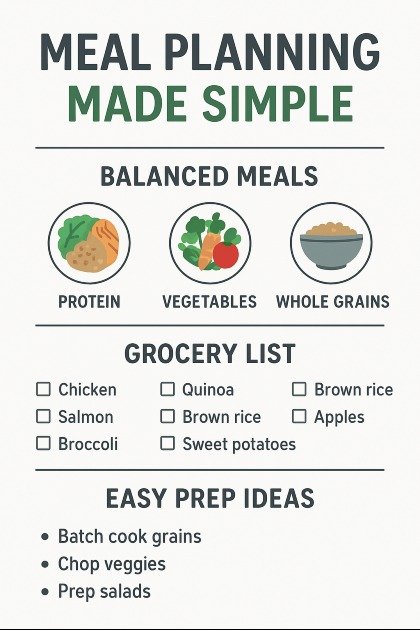Have you ever stared into your fridge at 6 PM, wondering, “What on earth am I going to cook tonight?” If so, you are not alone. The chaos of daily life often turns mealtimes into a stressful scramble rather than a nourishing ritual.
Meal planning is a strategy that saves time, reduces stress, and aligns meals with health goals. It allows for efficient meal preparation, a balanced diet, and budget-friendly grocery shopping.
Harvard Health advises planning menus, shopping smartly, and keeping pantry stocked with whole grains, beans, and frozen vegetables for delicious nutrition at dinner time.
It allows experimentation with diverse flavors and recipes and can adapt to specific dietary needs. This approach enhances energy, improves nutrition, and supports long-term wellness.
This article empowers individuals to take control of their meals with ease and confidence, making every meal intentional, delicious, and stress-free.
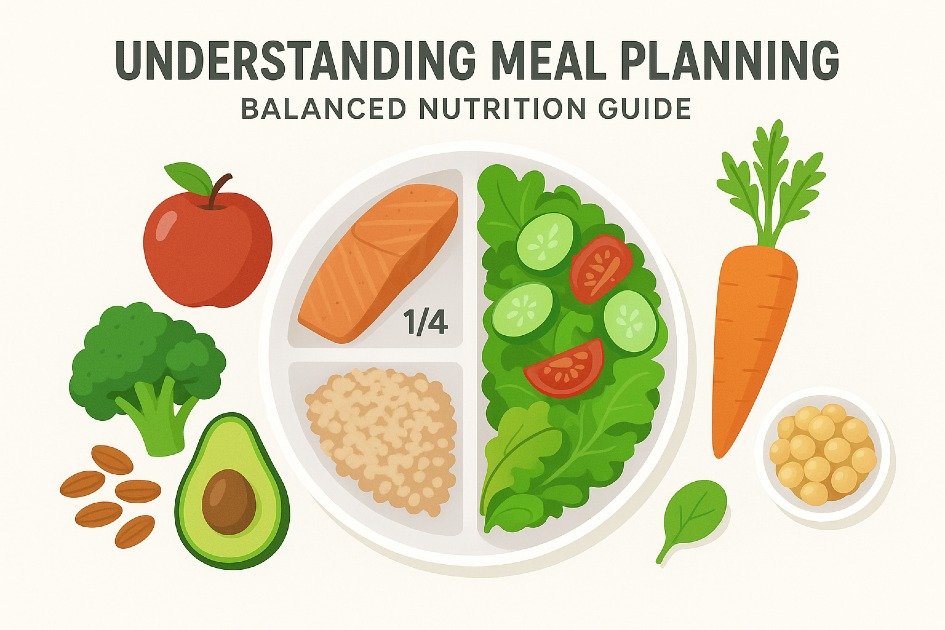
Understanding Meal Planning
Meal planning is a life-changing tool that allows you to control your nutrition and schedule, despite challenges like busy days or fussy eaters.
The Hidden Cost of Skipping Meal Planning
Lack of meal planning leads to life’s plan, increasing costs and stress, and can negatively impact mental energy and mental health.
Start small by planning three dinners a week. Add lunches or breakfasts as you go. A weekly meal planner helps you see your week clearly and control grocery costs.
I plan my meals, spend less time, waste less, and felt more relaxed every evening.
Identifying Your Meal Planning Goals
Before meal planning, consider your “why”: healthier eating, saving money, or saving time. Understanding your motivation makes it easier to maintain the habit.
Write your top three food goals on paper. You could aim to eat more veggies, cut takeout in half, or pack lunch for work. Use apps like MealPrepPro to track your progress and stay on target.
Setting clear goals changed how I plan meals. Now, I make energy-boosting dinners for my family.
Assessing Your Pantry: Where Many Plans Fail
Planning meals without knowing what you already have is a common mistake, leading to duplicate purchases or food spoilage.
Check your pantry and fridge each week. Sort food into groups like grains, proteins, and fruits or veggies. Keep a grocery list so you buy only what you need.
I checked my pantry and saw I already had pasta and plenty of beans. By knowing what I had, I saved money, cut waste, and made meal planning easier.
Crafting a Simple and Flexible Meal Schedule
Meal planning can be overwhelming due to rigid schedules, which can make it feel like a trap, emphasizing the importance of flexibility in life.
Plan your week around key meals such as Monday dinner and Wednesday lunch. Keep other days open for leftovers or quick choices. Use a color-coded meal planner to see your weekly balance briefly.
I keep one meal each week as my free choice. It might be takeout or a special family meal. This little break helps me stay balanced and keep my healthy routine going strong.
Choosing Recipes That Stick
Many individuals fail due to selecting complex or unsuitable recipes.
Keep your meals simple, balanced, and tasty. Use a few favorite recipes and try one new dish each week.
I add one new recipe each week to keep our meals fun and simple. My kids choose the theme, and together we find new favorites to enjoy.
Batch Cooking and Prep Techniques
The key to efficient meal preparation is not to make it feel like a full-time job, but rather to focus on efficiency.
Cook rice, vegetables, or chicken in batches for the week. Cut fruits and veggies ahead for quick snacks. Keep meals in portioned containers so you can grab them fast.
I spent two hours on Sunday prepping my meals and cut my cooking time during the week by more than half. Keeping everything in airtight containers made my food stay fresh longer.
Shopping Smart: The Lifeline of Meal Planning
A poorly executed grocery trip can significantly disrupt even the most effective meal plan.
Plan your meals, then write a shopping list and follow it. Focus on fresh foods like fruits, veggies, and lean proteins around the store’s edges. Try online grocery delivery to save time and avoid impulse shopping.
Shopping with a plan turned my grocery trips from messy to easy. I stopped wasting time in the aisles and started enjoying making meals I love.
Staying Balanced Without Stress
Some individuals may experience feelings of restriction or boredom even with meal planning.
Eat a mix of protein, whole grains, healthy fats, and colorful veggies. Enjoy small treats too, they help you stay on track.
I let myself enjoy one small treat each week. This simple habit stopped cravings from ruining my healthy meals.
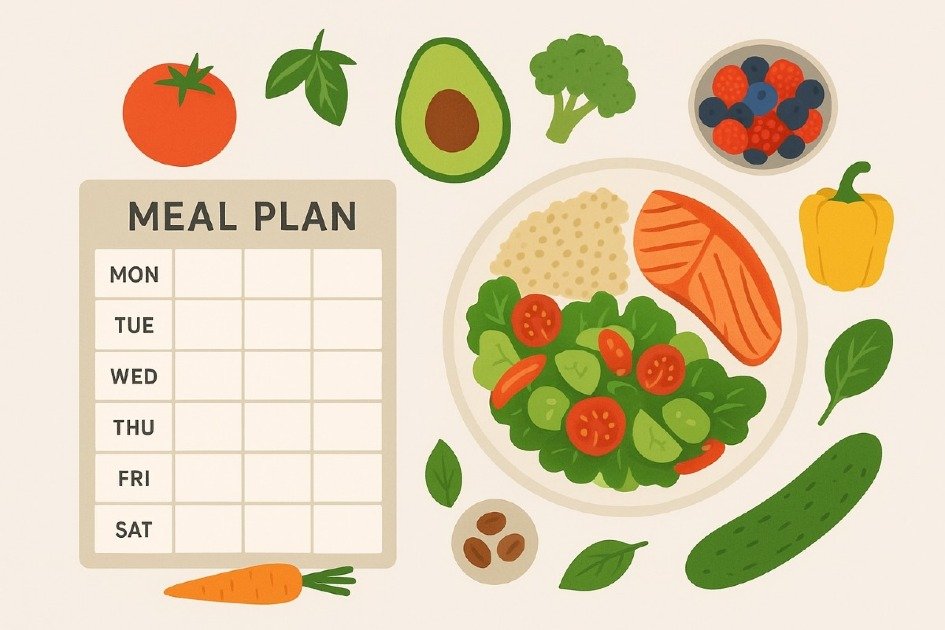
Why Meal Planning Matters
Meal planning is a crucial tool for transforming kitchen chaos into a stress-free routine, saving time, money, and energy while maintaining family health and happiness.
Save Time in Your Busy Week
Why it matters:
Time is valuable, but without a plan, you spend hours deciding what to cook, running last-minute grocery trips, or ordering expensive takeout, increasing stress.
How to do it:
- Spend 20 to 30 minutes every Sunday planning your meals for the week.
- Prep ingredients in advance by chopping vegetables and marinating proteins to save time and boost flavor.
- Keep a handy list of quick meals you can make in 30 minutes or less.
I follow these steps to free up hours each week and spend my evenings relaxed and stress-free.
Ease Dinner-Time Stress Daily
Why it matters:
The daily “what’s for dinner?” dilemma can lead to decision fatigue, affecting mood and energy levels, and making mealtime a source of tension rather than enjoyment.
How to do it:
- Try theme nights to make meals easy. Enjoy tacos on Tuesday, pasta on Friday, and soup on Sunday.
- Try keeping 10 to 15 favorite meals ready and switch them often.
- Save time by using leftovers wisely instead of cooking every night.
- Let each family member choose and prepare one meal each week to share the responsibility.
When I plan my meals ahead, my evenings feel calm and stress-free.
Reduce Food Waste and Save Money
Why it matters:
Meal planning is crucial to avoid overbuying and spoilage, which wastes food and drains budgets, ensuring you only buy what you need.
How to do it:
- Plan meals for the week and write a clear shopping list with only what you need.
- Look in your pantry and fridge before shopping to prevent buying the same items twice.
- Purchase commonly used items in substantial amounts and freeze smaller portions for later use.
- Monitor your spending for a few weeks spotting habits and cut unnecessary buys.
I shop with purpose, so I save money and never feel guilty about throwing food away.
Support Better Nutrition and Balanced Eating
Why it matters:
Unplanned meals often rely on fast food or convenient, nutrient-poor options, while thoughtful meal planning ensures consistent, balanced nutrition for you and your family.
How to do it:
- Eat proteins, carbs, and healthy fats in every meal to fuel your body, boost energy, and support overall health.
- Eat fruits and vegetables of many colors to get all the essential vitamins and minerals your body needs.
- Plan and prepare healthy snacks ahead so you reach for good choices, not junk.
- To prevent nutritional gaps and boredom, it is recommended to rotate proteins and vegetables.
I feel more energetic, happier, and stronger when I eat balanced meals that fuel my body and protect my health.
Build Healthy Habits That Last
Why it matters:
Meal planning is crucial for long-term healthy eating habits, as it involves simple, repeatable, and achievable habits that stick.
How to do it:
- Begin by planning a few dinners each week and slowly add more as you go.
- Track your meals in a journal to see what helps you stay healthy and what does not.
- Try new ingredients and flavors to make cooking fun and exciting instead of boring.
I make meal planning a regular habit and eating healthy feels easy and natural.
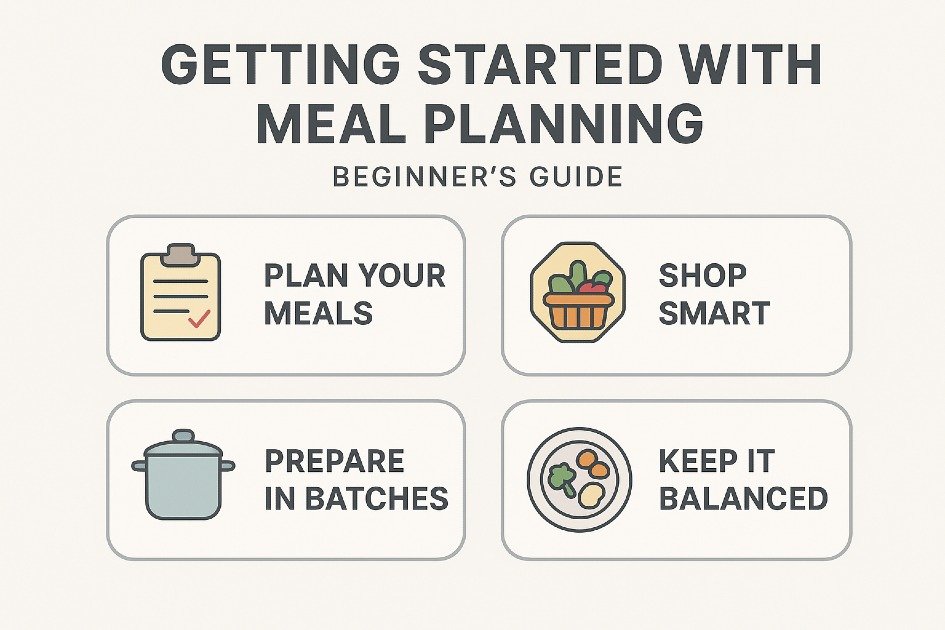
Start Your Simple Meal Planning Today
Starting a meal planning journey can be overwhelming, but with the right approach, it can save time, promote healthier eating, and reduce stress.
Set Clear Goals for Health, Time, and Budget
Why it matters:
Identifying your goals and priorities is crucial for effective meal planning, as without it, it can feel chaotic and unsustainable.
How to do it:
- Set your main goal by choosing what matters most, like losing weight, boosting energy, or cutting costs.
- Focus on your top priorities. If saving time matters, choose recipes that keep well or can be cooked in batches.
- Keep a record of your meals for a week to discover where you spend the most time or money.
- Start with small, achievable goals and improve your plan as you go.
I keep my meals on track and watch my progress grow by using a meal planning app every day.
Check Your Pantry and Fridge Before You Shop
Why it matters:
Inventory management is crucial for effective planning, as it prevents unnecessary grocery trips and reduces food waste, a hidden expense.
How to do it:
- Clear out your pantry and fridge and spread out all your food so you can see exactly what you have.
- Sort items into proteins, grains, canned goods, and fresh produce.
- Use ingredients that will expire soon first to reduce waste and keep your meals fresh.
- Use what you have by planning meals around ingredients in your kitchen.
I organize my shopping list by color for each food group so I can grab what I need quickly and make my grocery trips faster and easier.
Plan Meals That Match Your Daily Life
Why it matters:
A well-planned meal plan is useless if it does not align with your daily routine, so creating a personalized schedule is crucial for maintaining consistency and reducing stress.
How to do it:
- Track your week by writing down your work hours, family duties, and free moments.
- Set aside one or two days to prepare ingredients or cook in batches for the week.
- Keep your meals flexible by choosing options that can be swapped easily when plans change.
- Focus on planning lunches and dinners first while keeping breakfast simple.
I plan my meals for the week using a template so I can see everything at once and skip the guesswork.
Pick Easy Recipes You Love
Why it matters:
Simple, enjoyable recipes enhance motivation and make meal planning easier and more enjoyable.
How to do it:
- Pick 3 to 5 favorite recipes and rotate them weekly to keep meals fresh and exciting.
- Try new foods while keeping your favorite meals. This keeps eating fun, healthy, and exciting every day.
- Cook proteins, grains, and vegetables in batches so you can mix them into different meals all week.
- Plan meals to fit your household so you waste less food.
I explore healthy recipe collections to find fresh ideas for meals I can enjoy.
Getting Ingredients Ready Early
Why it matters:
Meal prep reduces stress and simplifies sticking to plans, while having ready-to-use ingredients makes your week more efficient and organized.
How to do it:
- Prep vegetables ahead of time and store them in clear containers so you can easily see what is ready to use.
- Prepare proteins in advance by roasting chicken, boiling eggs, or grilling tofu to save time.
- Cook grains like rice, quinoa, or pasta in large batches and store them for easy meals all week.
- Mark containers with dates to track freshness and prevent food from spoiling.
I keep my food fresh longer by using stackable airtight containers. They save space, stay organized, and lock in flavor so nothing goes to waste.
Create a Smart and Simple Grocery List
Why it matters:
A well-organized grocery list helps prevent impulse purchases, saves money, and ensures you have essential ingredients for your meal planning routine.
How to do it:
- Focus on proteins, grains, fresh fruits and vegetables, and essential pantry items for a strong, balanced diet.
- Choose fresh fruits and vegetables that are in season to save money and enjoy better taste.
- Review recipes first and add every ingredient to your shopping list.
I keep a digital grocery list that synchronizes on all my devices so I can shop faster and never forget anything.
Plan for Snacks and Small Meals
Why it matters:
Snacks should be thoughtfully planned to maintain energy levels and promote balanced nutrition, as ignoring them can lead to unplanned eating and unhealthy choices.
How to do it:
- Pack healthy snacks like nuts, fruit, or yogurt in small containers for easy, smart eating.
- Add protein and fiber to your meals to stay full and satisfied longer.
- Keep healthy snacks handy to stop yourself from grabbing junk food when you are hungry.
I rotate my snacks every week to keep things fun and fresh.

Balancing Nutrition Without Overthinking
Balancing nutrition does not require full-time work; practical strategies can plan meals that nourish, save time, and reduce stress, implementing changes that work for your lifestyle.
Mix Proteins, Carbs, and Fats for Energy
Why it matters:
Proteins repair muscles and maintain fullness, carbohydrates fuel the brain and body, and healthy fats support heart health and hormone balance.
How to do it:
- Add protein to every meal with eggs at breakfast, chicken or tofu at lunch, and fish at dinner for steady energy and strong muscles.
- Pick healthy carbs such as quinoa, brown rice, or sweet potatoes instead of white bread or pasta for better energy and nutrition.
- Include healthy fats like olive oil, avocados, and nuts to boost heart health and energy.
When my plate feels balanced, I like adding colorful foods to make each meal more fun and healthier.
Load Up on Colorful Veggies for Variety
Why it matters:
The color spectrum in vegetables provides various vitamins, minerals, and antioxidants, supporting long-term health and immunity.
How to do it:
- Add three colors to your meal with orange carrots, green spinach, and red bell peppers for a healthier, more balanced plate.
- Wash, cut, and store your veggies early so they are ready when you need them.
- Roast, steam, or sauté your food to keep its taste and lock in nutrients for a healthier meal.
- Try healthy veggie swaps like zucchini noodles instead of pasta or cauliflower rice in place of white rice for a lighter, nutrient-packed meal.
When I add colorful veggies and control my portions, I give my body the right fuel without eating too much.
Portion Control Made Simple
Why it matters:
Overeating, even healthy foods, can hinder weight management. Proper portions provide steady energy and reduce decision fatigue during meal planning.
How to do it:
- Guide your meals with your hand. Fill your palm with protein, your fist with carbs, your thumb with healthy fats, and two fists with vegetables.
- Divide snacks like nuts or yogurt into small containers instead of eating straight from big packages.
- Serve your food on a plate first to stop mindless second helpings.
- Adjust your portion sizes to match your activity, eating more on busy days and less on rest days.
I control my portions and choose meals that fill me up and satisfy my cravings without making me feel guilty.
Plan Snacks That Nourish, Not Sabotage
Why it matters:
Hunger can lead to impulsive, unhealthy choices, but healthy snacks maintain blood sugar and energy levels and can enhance overall nutrition when chosen wisely.
How to do it:
- Keep healthy snacks ready like baby carrots, Greek yogurt, or a small handful of almonds to stay energized and curb cravings.
- Pair fruits with protein like apples and peanut butter, or enjoy veggies with hummus for a balanced, nutritious snack.
- Pack your meals in lunchboxes or snack containers to control portions and stay on track with healthy eating.
- Pack a weekly snack box for quick grab-and-go treats that save time on busy days.
I keep my meals balanced by making my nutrition plan flexible and fun, not just focusing on the food.
Hydration Keeps Your Body Strong and Healthy
Why it matters:
Staying hydrated aids digestion, energy levels, and cognitive function, while preventing unnecessary snacking and promoting efficient nutrient absorption.
How to do it:
- Drink at least eight glasses of water every day and increase it when you are active or the weather is hot.
- Add fruit or herbs to water to make it tasty without sugar.
- Carry a reusable water bottle where you can see it to drink water regularly and stay hydrated all day.
I plan my meals with balanced foods, colorful veggies, smart portions, healthy snacks, and plenty of water to make eating easy, stress-free, and good for my body.
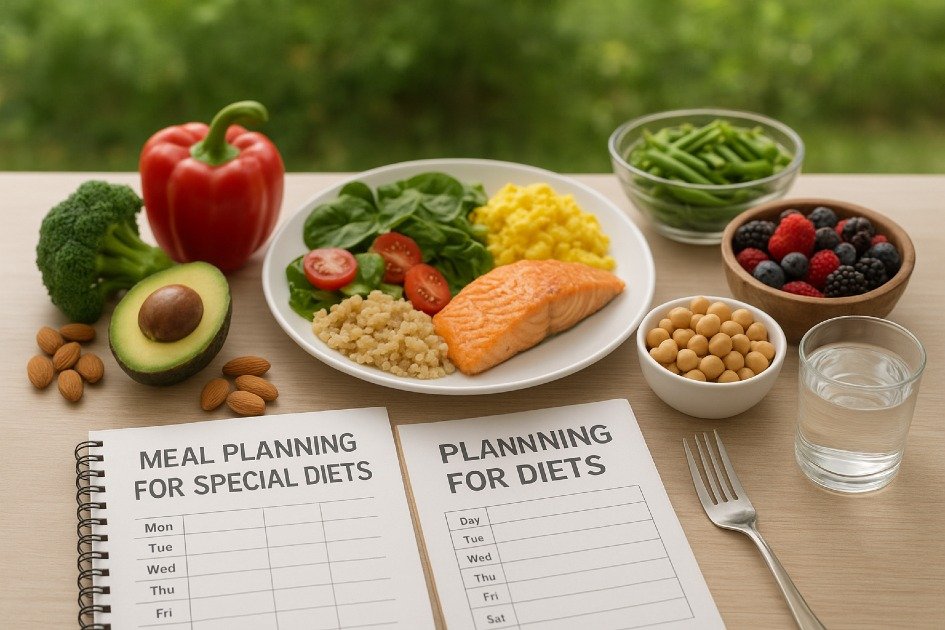
Meal Planning for Special Diets
Meal planning for special diets can be overwhelming but understanding the importance and implementing it without stress can lead to nutritious, satisfying meals even during busy weeks.
Smart Vegetarian Meal Planning Made Simple
Why it matters:
Vegetarians often struggle to obtain sufficient protein and iron, but meal planning ensures balanced nutrition and prevents unhealthy choices.
How to do it:
- Combine different protein sources like beans, lentils, tofu, tempeh, and Greek yogurt for a stronger, healthier diet.
- Eat colorful meals by including leafy greens, bell peppers, and sweet potatoes to naturally boost your vitamins and nutrients.
- Save time by chopping vegetables and cooking beans in batches.
- Switch to meatless meals on Mondays and enjoy discovering new, healthy recipes.
Smart Vegan Meal Planning Made Simple
Why it matters:
Vegan diets may lack essential nutrients like vitamin B12, omega-3s, and complete proteins. Proper meal planning ensures all nutrient bases are covered and prevents energy slumps.
How to do it:
- Mix beans, lentils, chickpeas, quinoa, and nuts for a strong and varied protein boost.
- Boost your meals with fortified plant milks, sprinkle nutritional yeast, and add seeds for extra nutrients.
- Boost your meals with herbs, spices, and a splash of citrus to make every bite flavorful and exciting.
- Cook your staples in one session by roasting vegetables and preparing grains.
- Try meal planning with apps or printable trackers to easily monitor your nutrients.
Gluten-Free Meal Planning Made Simple and Smart
Why it matters:
Gluten sensitivity or celiac disease necessitates meticulous meal planning to prevent digestive issues, fatigue, and inflammation, while also minimizing accidental exposure during outings or on-the-go eating.
How to do it:
- Keep gluten-free grains such as rice, quinoa, and oats on hand for healthy, versatile meals.
- Prepare snacks ahead of time by keeping nuts, fruit, and gluten-free bars ready for quick, healthy grabs.
- Try using almond flour, chickpea pasta, or gluten-free bread as healthy alternatives.
- Eat balanced meals with protein, healthy fats, and fiber to keep hunger away longer.
Smart Meal Planning for Healthy Families
Why it matters:
Family-focused meal planning helps everyone eat well without stress, reduces food waste, and avoids mealtime battles due to fussy eaters or busy schedules.
How to Do It
- Have children choose vegetables and help stir the ingredients to make mealtime fun and encourage healthy eating.
- Offer familiar favorites such as homemade pasta sauces or simple stir-fries to make meals enjoyable and easy for everyone.
- Try new foods gradually by mixing them with favorites to make tasting easier and more enjoyable.
I enjoy planning meals for my special diet by learning why each change matters and using simple steps to make healthy, tasty meals without stress.

Master Smart Solutions for Meal Planning
Meal planning can be challenging, but strategic addressing of hurdles can make it smoother, enjoyable, and sustainable. Breaking down familiar challenges with practical solutions is essential.
Keep Your Menu Fresh with New Ideas
Why it matters:
Maintaining a consistent meal plan can be challenging due to boredom, so variety is essential for maintaining healthy eating habits and avoiding unhealthy options.
How to do it:
- Keep a recipe collection by saving your favorite meals in a folder or digital file.
- Try new proteins or vegetables in your favorite dishes to make meals exciting and healthy.
Avoiding Fussy-Eater Pitfalls
Why it matters:
Meal planning for fussy eaters can be challenging, and frustration over rejected meals can hinder planning efforts.
How to do it:
- Let every family member pick one meal each week. This builds teamwork and keeps everyone happy with the menu.
- Try new foods gradually by blending unfamiliar vegetables into familiar dishes like pasta or casseroles to make them more appealing.
- Let everyone build their own meal with taco bars, grain bowls, or salad stations, choosing toppings they love.
I get my kids excited about meals by using kid-friendly meal kits. They love helping me cook, and it turns every mealtime into a fun, hands-on activity that also teaches them healthy choices.
Manage Overwhelm and Simplify Choices
Why it matters:
Overcomplicating meal planning can lead to decision fatigue, causing skipped planning or unhealthy choices at the last minute.
How to do it:
- Keep recipes simple and use five ingredients or fewer.
- Pick one protein, one carb, and one vegetable each week, then mix and match them to create easy, healthy meals.
I turn meal planning into a simple lifestyle by choosing fresh menus, sticking to a budget, staying flexible, and involving everyone.
Recap: Master Your Meals for a Healthier Diet
Meal planning is a lifestyle upgrade that transforms a diet into a tool for energy, focus, and vitality.
Harvard Health recommends consuming about half of your plate vegetables and fruits, along with whole grains, healthy proteins, and oils, as the quality of your meals significantly impacts your health.
By planning meals, you take control over your diet, avoiding impulsive choices and achieving healthy goals without feeling deprived.
A simple, mindful diet can be exciting and enjoyable, and meal planning can lead to smarter grocery shopping, reducing waste and saving money.
A deliberate diet allows for indulgence without guilt, making meals a source of pleasure. A consistent diet is a journey, taking intention, creativity, and small steps.
Frequently Asked Questions
How far in advance should I plan my meals?
Meal planning can be flexible and structured, allowing for alignment with diet goals, seasonal produce, and family schedules. Using a meal planning app can streamline the process.
What if my schedule changes after I have planned meals?
Flexibility is key in life, so keep a list of quick, nutrient-dense meals that can be swapped at short notice, such as frozen vegetables, pre-cooked grains, and lean proteins.
How do I keep meals interesting week after week?
Rotate recipes, experiment with global flavors, introduce new ingredients weekly, and use meal subscription services for inspiration without trial-and-error.
Is meal planning only for large families?
Meal planning is beneficial for individuals, couples, and families as it helps manage portion sizes, supports a balanced diet, and saves time and money.
How can I get my kids involved in meal planning?
Engaging children in meal prep early promotes healthy eating habits, encouraging them to choose recipes, chop vegetables, and try new foods, and using kid-friendly kitchen tools can make the process enjoyable.
Can meal planning help with specific dietary goals?
Structured meal planning aids in weight management, muscle gain, and heart health by efficiently tracking macronutrients, portion sizes, and caloric intake.
How do I shop efficiently without overspending?
A strategic grocery plan, including seasonal produce, bulk purchases for staples, and subscription boxes for pantry essentials, can help maintain a healthy diet and reduce costs.
What if I want to follow a specialized diet?
Meal planning is crucial for specialized diets like keto, vegan, paleo, or gluten-free, ensuring ingredients are prepared and minimizing mistakes.
How can I store meals to maximize freshness?
Maintaining freshness and nutrient content in meals requires proper storage, using airtight containers, vacuum-sealed bags, or freezer-friendly options, and labeling with prep dates for efficient diet management.
Can meal planning improve overall health?
Meal planning promotes dietary discipline, reduces processed food consumption, and ensures nutrient variety, leading to improved energy, digestion, and long-term health outcomes, while reducing stress.

